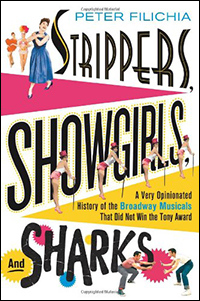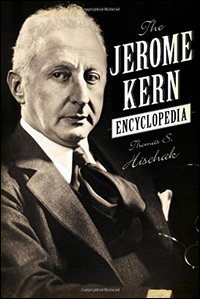
"Brush up your Shakespeare, start quoting him now," advised Cole Porter, "and the women you will wow." Wowing the women is clearly not what Ludwig has in mind in his new tome, "How to Teach Your Children Shakespeare" [Crown], but then I don't suppose that was uppermost in Porter's mind either. Not, that is, to compare Ludwig with Porter.
Ludwig, as playgoers are aware, is the contemporary playwright best known for his farce comedies Lend Me a Tenor and Moon over Buffalo, as well as the Gershwin-derived musical Crazy for You. A lawyer by training, it also turns out that he is steeped in Shakespeare — so much so that he naturally found himself drumming the Bard into the impressionable minds of his now-grown children, back when they were in the first grade.
The conceit of the book is that if your children (and you) memorize 25 speeches from the Bard, the rewards will be everlasting. Said rewards including a sense of accomplishment, the mastery of memory; a better understanding of human nature, as represented by Shakespeare; and a more comfortable appreciation of the plays themselves — plus, giving his children a repertoire of passages so they can "spout them whenever the occasion presents itself." That could wow the women, yes, but it is more likely to have a practical payoff in school tests, admission essays and the like.
Memorization brings more than memorization, of course. Ludwig's method is to explain — and in a way, translate — the passages, on the theory that the more you understand, the easier the words. Intimate familiarity with specific passages — four from both A Midsummer Night's Dream and Twelfth Night, five from Hamlet, plus selections from another six titles — will make you infinitely more at ease with those plays. And with your memory carrying around hundreds of lines of Shakespeare, you'll be less likely to be intimidated by Troilus and Cressida, won't you? (For readers who discover they have a special facility for this sort of thing, Ludwig lists another 55 passages to tackle.)
The immediate question is (at least, my immediate question was): Is he kidding? That is, is the purpose of this book to "teach your children Shakespeare"? That suggests that the book is intended for parents of pre-teens, or more specifically the teeny subset of parents who have Shakespeare on their personal radar to begin with. While I am not much on market research, I expect there'd be an infinitely larger audience out there for, "How to Teach Your Children Soccer." I expect — though Ludwig might demur — that this book is for you. You being the general, reasonably-educated reader who is capable of enjoying an evening of Shakespeare but never acquired the tools to intellectually participate in the plays. Go through the first few chapters and walk away with Oberon's "wild thyme" speech, Bottom's Dream, and Puck's "what fools these mortals be" on the veritable tip of your tongue. You might well notice a difference in your relationship with the Bard, namely more enjoyment with less effort.
But taking your copy of this book and sitting down with a six-year-old? How exactly would that work? I would have gladly tried to do so with my children at that age, although I don't know how far we would have gotten. (I expect that Ludwig, with a memory bank full of Shakespeare, could whittle away at it on long walks and car rides without needing to drill them from a book.) At the same time, I've just watched my 13-year-old spend a semester learning — and learning to appreciate — A Midsummer's Night Dream. It worked out fine, but I can only imagine how far ahead he'd have been if he walked in proficient in Ludwig's first 50 pages.
Part of me wants to test this by giving a copy of the book to some friends who have twins about to start kindergarten. Something about it, though, sounds like it would be one of those presumptuous gifts that could put caring, hard-working parents on the spot. I would certainly imagine that with the right parent and the right kid, Ludwig's method would work like a midsummer dream.
More to the point, though, is whether "How to Teach Your Children Shakespeare" will help you — a non-child, presumably — to brush up your Shakespeare? Most decidedly, forsooth.
*
| |
 |
|
| Cover art |
Filichia concentration is indeed on musicals that lost the Tony Award, 153 of them. (Far more than 153 musicals didn't win the Tony, of course; the author restricts himself to shows that were nominated but lost. This leaves out titles like the non-nominated Camelot, although Filichia uses his prerogative to discuss that one, anyway.)
As he mentions the shows, we get a brief picture of what else was happeing that season; what did, in fact, win; and what Filichia believes should have won. Most of the discussion, though, consists of something like a conversational description of the plots of the musicals. For readers who only know these shows via their cast albums, and most readers of this book are likely to have many of the cast albums memorized, Filichia helpfully fills in the picture by telling us what actually happens between the songs.
*
| |
 |
|
| Cover art |
What makes this one different, though, is the scope of the material. Most Broadway reference books use 1925, or 1927, the year of Kern's Show Boat, as a starting point. Kern died at the age of 60 in 1945, so much of his career falls prior to that golden year. This makes it mighty difficult to dig up information on his earlier work. The influential Princess Theatre musicals, are an example: six shows written by Kern and Guy Bolton — mostly with P.G. Wodehouse — which are generally credited with setting the course for the modern American musical theatre. "The Jerome Kern Encyclopedia" — quite naturally — gives us full information on these shows. On all of Kern's 40 pre-Show Boat musicals, in fact.
There are some questionable inclusions. Bob Hope spent nine months of his 100 years in a Kern musical; Dorothy Lamour, Gloria Swanson and Ann Miller appeared in one Kern film. They each get a full page bio. Here we get listings for musicals like Have a Heart and performers like Fred Stone. That's the value of "The Jerome Kern Encyclopedia," which gives us quick access to hard-to-find, early information.
* Amy Herzog is one of the several bright new playwrights who have lately burst on the scene with one good play after the other. Four since 2010, in Herzog's case; so much so that an intriguing and provocative play like The Great God Pan could get more or less overlooked by audiences. Her first two plays to reach New York, 4000 Miles and After the Revolution [tcg], have now been published. Those of you who haven't yet had the opportunity to see Herzog's plays might want to read them and find out what we critics have been so excited about.
(Steven Suskin is author of the updated and expanded Fourth Edition of "Show Tunes" as well as "The Sound of Broadway Music: A Book of Orchestrators and Orchestrations," "Second Act Trouble," "A Must See," the "Broadway Yearbook" series, and the "Opening Night on Broadway" books. He also writes the Aisle View blog at The Huffington Post. He can be reached at [email protected].)









